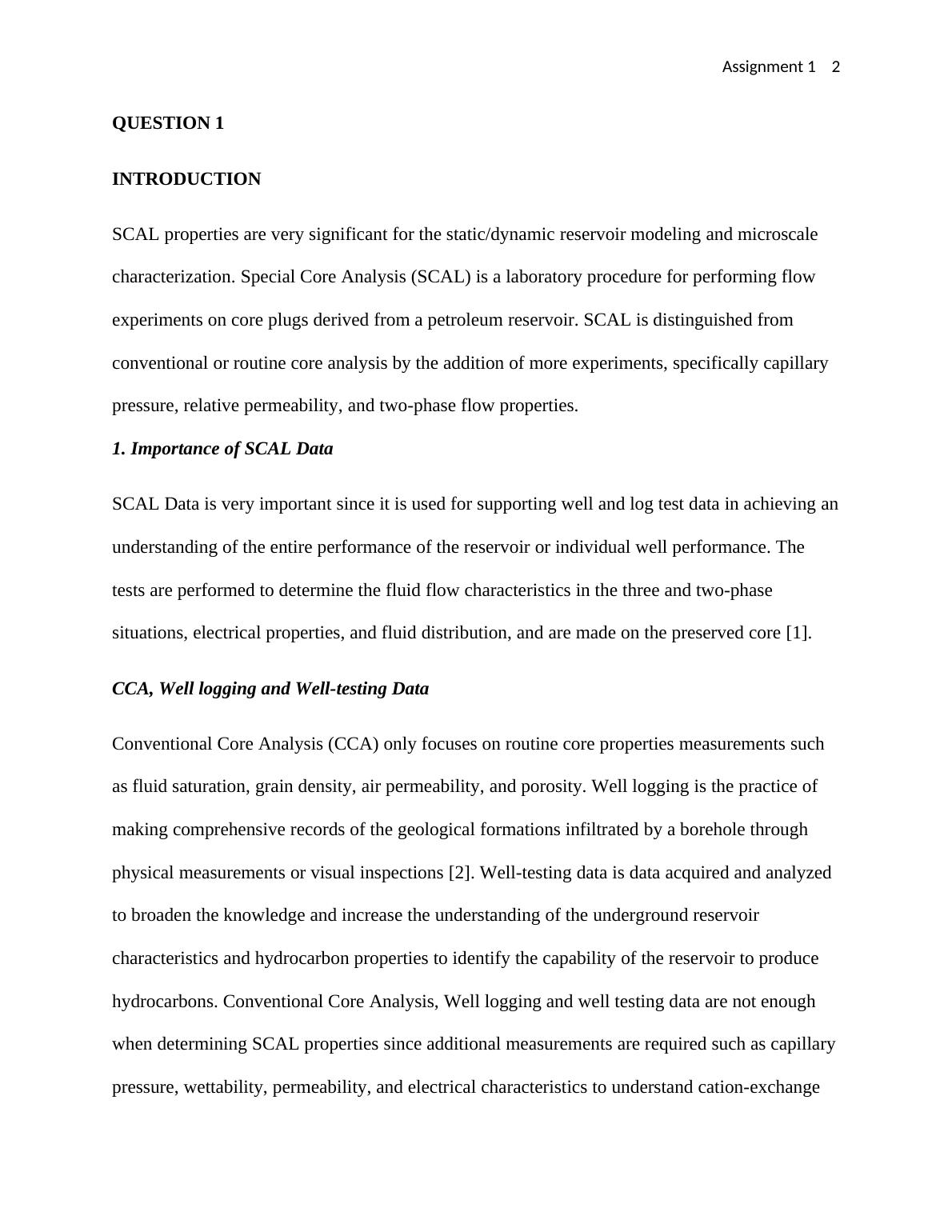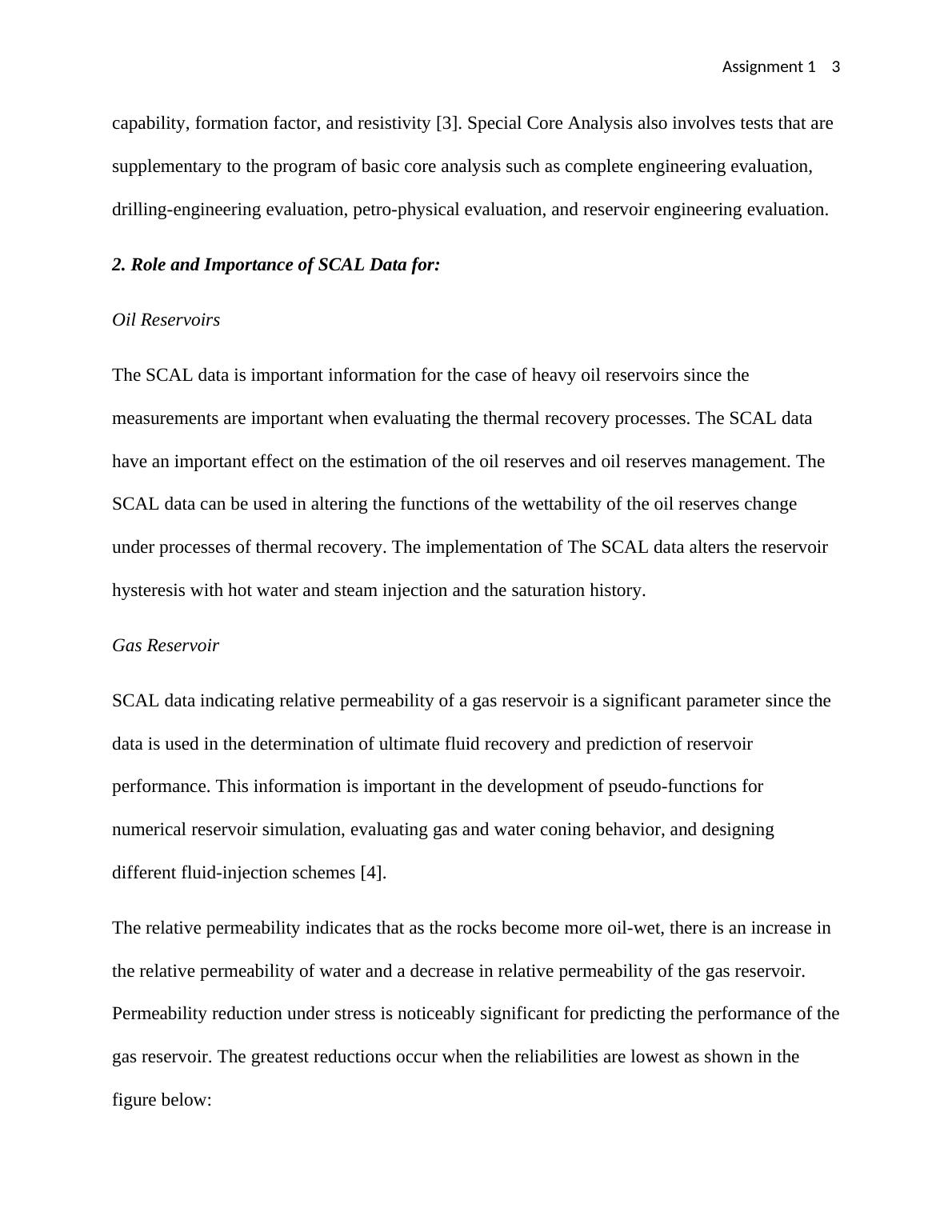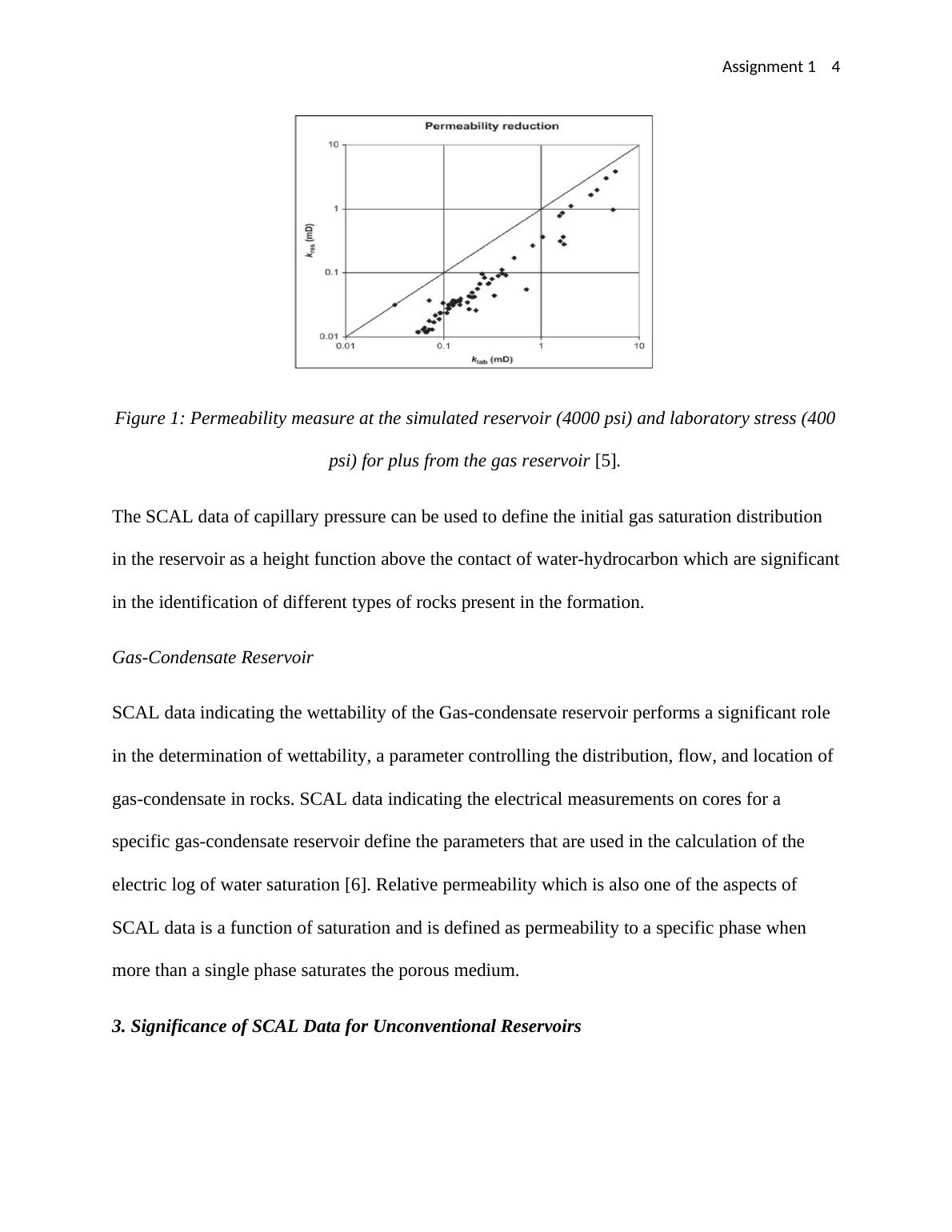Reservoir Engineering docx.
Added on 2022-08-14
15 Pages3897 Words15 Views
Assignment 1 1
RESERVOIR ENGINEERING II
By Name
Course
Instructor
Institution
Location
Date
RESERVOIR ENGINEERING II
By Name
Course
Instructor
Institution
Location
Date

Assignment 1 2
QUESTION 1
INTRODUCTION
SCAL properties are very significant for the static/dynamic reservoir modeling and microscale
characterization. Special Core Analysis (SCAL) is a laboratory procedure for performing flow
experiments on core plugs derived from a petroleum reservoir. SCAL is distinguished from
conventional or routine core analysis by the addition of more experiments, specifically capillary
pressure, relative permeability, and two-phase flow properties.
1. Importance of SCAL Data
SCAL Data is very important since it is used for supporting well and log test data in achieving an
understanding of the entire performance of the reservoir or individual well performance. The
tests are performed to determine the fluid flow characteristics in the three and two-phase
situations, electrical properties, and fluid distribution, and are made on the preserved core [1].
CCA, Well logging and Well-testing Data
Conventional Core Analysis (CCA) only focuses on routine core properties measurements such
as fluid saturation, grain density, air permeability, and porosity. Well logging is the practice of
making comprehensive records of the geological formations infiltrated by a borehole through
physical measurements or visual inspections [2]. Well-testing data is data acquired and analyzed
to broaden the knowledge and increase the understanding of the underground reservoir
characteristics and hydrocarbon properties to identify the capability of the reservoir to produce
hydrocarbons. Conventional Core Analysis, Well logging and well testing data are not enough
when determining SCAL properties since additional measurements are required such as capillary
pressure, wettability, permeability, and electrical characteristics to understand cation-exchange
QUESTION 1
INTRODUCTION
SCAL properties are very significant for the static/dynamic reservoir modeling and microscale
characterization. Special Core Analysis (SCAL) is a laboratory procedure for performing flow
experiments on core plugs derived from a petroleum reservoir. SCAL is distinguished from
conventional or routine core analysis by the addition of more experiments, specifically capillary
pressure, relative permeability, and two-phase flow properties.
1. Importance of SCAL Data
SCAL Data is very important since it is used for supporting well and log test data in achieving an
understanding of the entire performance of the reservoir or individual well performance. The
tests are performed to determine the fluid flow characteristics in the three and two-phase
situations, electrical properties, and fluid distribution, and are made on the preserved core [1].
CCA, Well logging and Well-testing Data
Conventional Core Analysis (CCA) only focuses on routine core properties measurements such
as fluid saturation, grain density, air permeability, and porosity. Well logging is the practice of
making comprehensive records of the geological formations infiltrated by a borehole through
physical measurements or visual inspections [2]. Well-testing data is data acquired and analyzed
to broaden the knowledge and increase the understanding of the underground reservoir
characteristics and hydrocarbon properties to identify the capability of the reservoir to produce
hydrocarbons. Conventional Core Analysis, Well logging and well testing data are not enough
when determining SCAL properties since additional measurements are required such as capillary
pressure, wettability, permeability, and electrical characteristics to understand cation-exchange

Assignment 1 3
capability, formation factor, and resistivity [3]. Special Core Analysis also involves tests that are
supplementary to the program of basic core analysis such as complete engineering evaluation,
drilling-engineering evaluation, petro-physical evaluation, and reservoir engineering evaluation.
2. Role and Importance of SCAL Data for:
Oil Reservoirs
The SCAL data is important information for the case of heavy oil reservoirs since the
measurements are important when evaluating the thermal recovery processes. The SCAL data
have an important effect on the estimation of the oil reserves and oil reserves management. The
SCAL data can be used in altering the functions of the wettability of the oil reserves change
under processes of thermal recovery. The implementation of The SCAL data alters the reservoir
hysteresis with hot water and steam injection and the saturation history.
Gas Reservoir
SCAL data indicating relative permeability of a gas reservoir is a significant parameter since the
data is used in the determination of ultimate fluid recovery and prediction of reservoir
performance. This information is important in the development of pseudo-functions for
numerical reservoir simulation, evaluating gas and water coning behavior, and designing
different fluid-injection schemes [4].
The relative permeability indicates that as the rocks become more oil-wet, there is an increase in
the relative permeability of water and a decrease in relative permeability of the gas reservoir.
Permeability reduction under stress is noticeably significant for predicting the performance of the
gas reservoir. The greatest reductions occur when the reliabilities are lowest as shown in the
figure below:
capability, formation factor, and resistivity [3]. Special Core Analysis also involves tests that are
supplementary to the program of basic core analysis such as complete engineering evaluation,
drilling-engineering evaluation, petro-physical evaluation, and reservoir engineering evaluation.
2. Role and Importance of SCAL Data for:
Oil Reservoirs
The SCAL data is important information for the case of heavy oil reservoirs since the
measurements are important when evaluating the thermal recovery processes. The SCAL data
have an important effect on the estimation of the oil reserves and oil reserves management. The
SCAL data can be used in altering the functions of the wettability of the oil reserves change
under processes of thermal recovery. The implementation of The SCAL data alters the reservoir
hysteresis with hot water and steam injection and the saturation history.
Gas Reservoir
SCAL data indicating relative permeability of a gas reservoir is a significant parameter since the
data is used in the determination of ultimate fluid recovery and prediction of reservoir
performance. This information is important in the development of pseudo-functions for
numerical reservoir simulation, evaluating gas and water coning behavior, and designing
different fluid-injection schemes [4].
The relative permeability indicates that as the rocks become more oil-wet, there is an increase in
the relative permeability of water and a decrease in relative permeability of the gas reservoir.
Permeability reduction under stress is noticeably significant for predicting the performance of the
gas reservoir. The greatest reductions occur when the reliabilities are lowest as shown in the
figure below:

Assignment 1 4
Figure 1: Permeability measure at the simulated reservoir (4000 psi) and laboratory stress (400
psi) for plus from the gas reservoir [5].
The SCAL data of capillary pressure can be used to define the initial gas saturation distribution
in the reservoir as a height function above the contact of water-hydrocarbon which are significant
in the identification of different types of rocks present in the formation.
Gas-Condensate Reservoir
SCAL data indicating the wettability of the Gas-condensate reservoir performs a significant role
in the determination of wettability, a parameter controlling the distribution, flow, and location of
gas-condensate in rocks. SCAL data indicating the electrical measurements on cores for a
specific gas-condensate reservoir define the parameters that are used in the calculation of the
electric log of water saturation [6]. Relative permeability which is also one of the aspects of
SCAL data is a function of saturation and is defined as permeability to a specific phase when
more than a single phase saturates the porous medium.
3. Significance of SCAL Data for Unconventional Reservoirs
Figure 1: Permeability measure at the simulated reservoir (4000 psi) and laboratory stress (400
psi) for plus from the gas reservoir [5].
The SCAL data of capillary pressure can be used to define the initial gas saturation distribution
in the reservoir as a height function above the contact of water-hydrocarbon which are significant
in the identification of different types of rocks present in the formation.
Gas-Condensate Reservoir
SCAL data indicating the wettability of the Gas-condensate reservoir performs a significant role
in the determination of wettability, a parameter controlling the distribution, flow, and location of
gas-condensate in rocks. SCAL data indicating the electrical measurements on cores for a
specific gas-condensate reservoir define the parameters that are used in the calculation of the
electric log of water saturation [6]. Relative permeability which is also one of the aspects of
SCAL data is a function of saturation and is defined as permeability to a specific phase when
more than a single phase saturates the porous medium.
3. Significance of SCAL Data for Unconventional Reservoirs

End of preview
Want to access all the pages? Upload your documents or become a member.
Related Documents
Importance of Relative Permeability - PDFlg...
|3
|1173
|189
Permeability Measurementlg...
|10
|1673
|91
Technical Challenges in Deepwater Operations for Oil and Gas Industrylg...
|5
|715
|335
